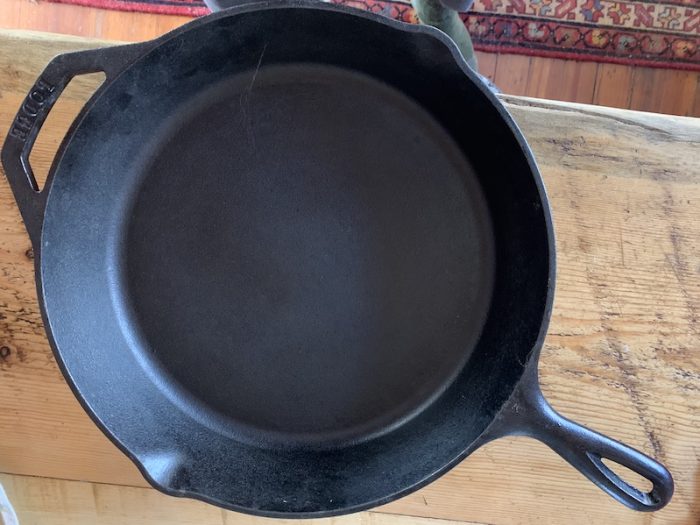I am very careful about my diet.
As a long-time vegan, I read and think quite a bit about nutrition, and I know that there are nutritional gaps that can appear in any diet. I also realize that iron can be one of these gaps for vegans, because the non-heme iron found in plant products is less easily absorbed than heme iron found in animal products.
So, I am particularly observant about being sure that I consume vegetables high in iron, and also consider food-combining, to add vitamin C to my iron meals and thereby increase absorption. I eat a lot of dark green vegetables, beans, tofu, nuts, and enriched food items. Luckily for me, I love these things, so it’s not hard to do at all.
Based solely on my diet, one would not think that iron deficiency would be a problem for me.
That’s not the only reason why I might feel secure in my iron stores. I also am a carrier for a genetic condition called hemochromatosis. This condition, when fully present, causes the body to absorb way too much iron, and can lead to some rather serious consequences. Carriers (who only have the gene from one parent), do not typically experience serious symptoms, but will often have higher than normal iron stores in the body.
Given this combination of factors, iron deficiency anemia doesn’t seem like a likely diagnosis for me to hear from a doctor, and yet I have, repeatedly. And this leads me to my primary point here – many things can create a risk for anemia, so it’s a good idea to have blood levels checked periodically and be treated as necessary, even if you have every reason to think that you could not possibly be anemic.
So, what are some of the risk factors that can lead to anemia?
- Diet is the most obvious factor. It’s not inherently more likely that one will become anemic as a vegetarian, vegan, or omnivore. It’s the actual items consumed that is important. A diet that is particularly restricted to low-iron foods (due to taste preference, family patterns, socio-economic status, or food availability) can result in the body not having the opportunity to absorb enough iron, which then leads to reduced production of red cells, and hence anemia.
- Being a female who has an ongoing menstrual cycle is a factor. Heavy or long menstrual periods or fibroid uterine growths are common causes of anemia for women. What counts as “heavy” or “long” varies by age, size, and also by bodily changes. Periods that a woman’s body could make up for in production in her 20s maybe be too long in her 40s.
- Bleeding due to ulcers, colitis, or other issues with the digestive system. Basically, it’s the same principle as in number two. If blood is being lost in the body at a rate that cannot be replaced, anemia can occur. The digestive tract is a common place for bleeding, and a place where it can go unnoticed for an extended period.
- Some medical conditions, including Celiac Disease, Crohn’s Disease, and having gastric bypass surgery can reduce the body’s ability to absorb and process iron in the diet.
- Finally, medications can also cause anemia. Antacids and other medications can prevent proper absorption of iron.
So, with the many things that can cause iron deficiency anemia, it’s not too surprising that so many people are affected by it. In the US, about 2% of men and 10-15% of women are affected. Given that, it’s a good idea to know the symptoms of anemia, even though they are a bit difficult to untangle, because they can be symptoms of so many conditions.
Photo: o5com on Flickr- Fatigue
- Shortness of breath
- Dizziness
- Headache
- Cold extremities
- Pale skin
- Brittle nails
- Cravings for non-food items
- Sores/cracks in the mouth and tongue
- Restless leg syndrome
- Frequent infections
- Arrhythmias of the heart
Because many of these symptoms could also be signs of other things, could be missed, or might just seem to be aging or a busy lifestyle, it’s a good idea to have a periodic complete blood count done to watch for anemia. If anemia is found in blood testing, further analysis can be completed to determine if the cause is iron deficiency or something else. Once iron deficiency anemia is diagnosed, there are a variety of treatments that could be used including:
- Iron supplementation via over the counter or prescribed liquid or tablets. Because some supplements are more easy to absorb than others, and different supplements contain different levels and types of iron, it is important to seek medical advice on iron supplementation. Supplements can be difficult on the digestive system if taken in large quantity, so that is an issue that has to be watched for when taking iron.
- Iron replacement injections can be used when a person is unable to adequately absorb iron through the digestive system. Some reactions are reported as a result of iron injections, but more recent forms seem to be less likely to cause allergic reactions than past injections were.
- Blood transfusions (followed by other treatments above) are sometimes required to get the red blood count back up to a safe level before treating the iron deficiency through diet or supplementation.
In my particular case, the symptoms of anemia were masked by other medical conditions, and the iron deficiency was caused by multiple non-dietary factors. Luckily, because I am in treatment for rheumatoid arthritis, I have regular blood work, making it easier to keep track of levels. Since the anemia is not caused by my diet, we are currently treating it with high levels of iron supplements, with a possibility of moving to injections if this is not successful. I’m looking forward to less of those pesky symptoms.
If you have any of the symptoms listed above and haven’t had a physical examination in the last six months, go check in with your primary care provider. It can’t hurt (other than that little needle sting) and it may provide information that allows you to take steps to improve your health. And, hey, if it turns out that your blood levels are great, you can always come back and lord it over me. I won’t even mind.







Read 8 comments and reply